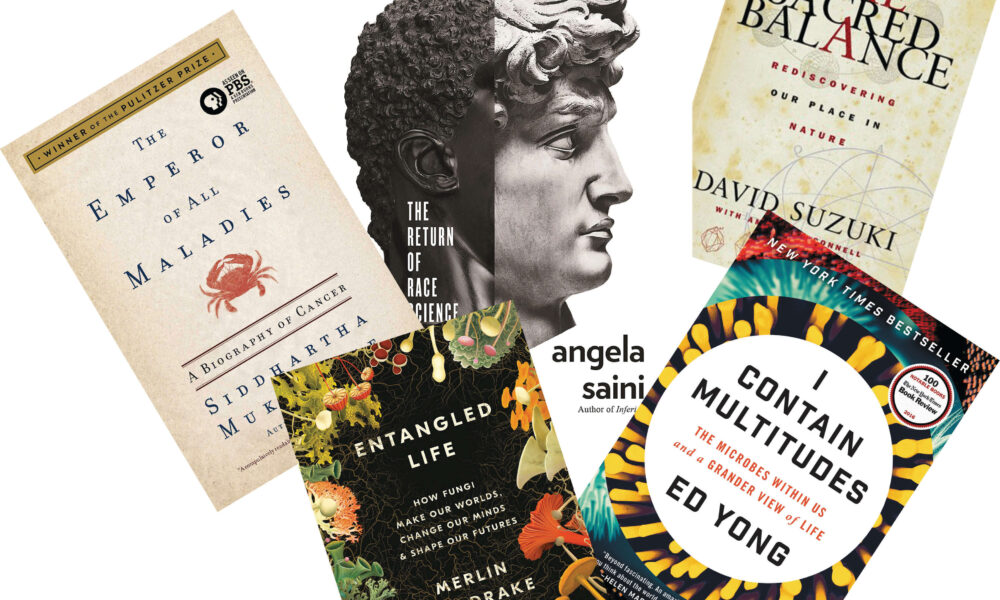As we head into the final weeks of the Fall 2022 semester, The McGill Tribune’s Science & Technology section has come up with a list of books to read over the winter break—or while procrastinating on assignments. Take the time to learn about science in a casual environment and don’t worry about an exam at the end of the book.
The Sacred Balance: Rediscovering our Place in Nature (David Suzuki)
David Suzuki is an iconic figure in the world of science. From his time on our screens as the host of The Nature of Things to his environmental activism through the David Suzuki Foundation, Suzuki has made the complexities of nature more digestible for generations of Canadians and others around the world. His book, The Sacred Balance: Rediscovering our Place in Nature, is no different.
Written with the help of Amanda McConnell and Adrienne Mason, Suzuki emphasizes the impacts of global warming on ecosystems and our way of life in a way that gives readers pause. He makes us think about our complicity in the climate crisis and inspires us to have more respect for the natural world by emphasizing the power of oceans, the importance of soil, and the “engine” of the planet: Fire.
Entangled Life: How Fungi Make Our World, Change Our Minds, and Shape Our Futures (Merlin Sheldrake)
Named as one of the 100 must-read books in 2020 by Time Magazine, Entangled Life by Merlin Sheldrake is a masterful account of the world of fungi. While mushrooms may be the first example that comes to mind there are many, many more kinds—the book explores everything from single-cell organisms like microscopic yeasts to multicellular filamentous moulds.
Sheldrake takes readers on a journey through the mostly-unseen world of fungi, proving that such tiny organisms actually play a huge role in maintaining the world we live in. After reading Entangled Life, you might think twice before stepping on a mushroom the next time you’re in the woods.
I Contain Multitudes: The Microbes Within Us and a Grander View of Life (Ed Yong)
Just like the world of fungi, the world of microbes is one that the average person knows little about. Ed Yong, a Pulitzer-Prize-winning science journalist at The Atlantic does his best to rectify this in his book I Contain Multitudes: The Microbes Within Us and a Grander View of Life. Yong’s writing style makes the complex world of microbes accessible to all those curious about the tiny but essential organisms in our lives.
Yes, nasty germs and bacteria are microbes, but so are the antibodies that keep us safe. Journey down the microscope with Yong to understand why microbes are not as bad as we may think—in fact, you learn about the crucial role the microbiome plays in gut health, and even in preventing neurological diseases such as dementia.
Superior: The Return of Race Science (Angela Saini)
Angela Saini minces no words in her book Superior: The Return of Race Science, which explores the ever-present racism in science that has been ignored in the name of “progress.” Beginning with an examination of the roots of racism in science that date back to before Darwin published On the Origin of Species, Saini traces the ways in which racism influenced many of the major scientific developments and constructed oppressive systems of the 19th, 20th, and 21st centuries.
Saini provides countless examples of the pervasiveness of racism in science: From the first attempts to track evolution, white scientists argued that white people were genetically superior to any other race to justify white supremacy. Eugenics—the theory that “planned breeding” could be used to maintain “racial purity”—emerged after World War II as a tool to be used to maintain the racial hierarchy There are many more instances that Saini uses to make white people understand that science is being used as a tool to perpetuate oppressive systems and uphold white supremacy.
The Emperor of All Maladies: A Biography of Cancer (Siddhartha Mukherjee)
Published in 2011 and winner of the 2011 Pulitzer Prize for general nonfiction, The Emperor of All Maladies: A Biography of Cancer delves into the history and science behind the world’s deadliest disease. Siddhartha Mukherjee uses his experience as a widely renowned cancer physician to craft a riveting tale about the evolution of cancer, from its first mention in ancient Persia to the future of cancer treatments such as immunotherapy.
While sometimes heavy, the discussion of cancer, the damage it has wrought, and our attempts to rectify that damage are important reminders of the progress scientists have made. Crack open this nearly 600-page book for a whirlwind tale of patients who have fought cancer and physicians who have tried to develop a cure.









